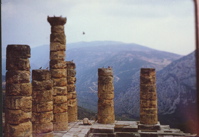Difference between revisions of "Ruins"
m (Text replacement - "http://nordan.daynal.org" to "https://nordan.daynal.org") |
m (Text replacement - "http://" to "https://") |
||
| Line 3: | Line 3: | ||
==Etymology== | ==Etymology== | ||
[https://nordan.daynal.org/wiki/index.php?title=English#ca._1100-1500_.09THE_MIDDLE_ENGLISH_PERIOD Middle English] ruine, from Anglo-French, from [[Latin]] ruina, from ruere to rush headlong, fall, collapse | [https://nordan.daynal.org/wiki/index.php?title=English#ca._1100-1500_.09THE_MIDDLE_ENGLISH_PERIOD Middle English] ruine, from Anglo-French, from [[Latin]] ruina, from ruere to rush headlong, fall, collapse | ||
| − | *Date: [ | + | *Date: [https://www.wikipedia.org/wiki/12th_Century 12th century] |
==Definitions== | ==Definitions== | ||
*1 a archaic : a falling down : collapse <from age to age…the crash of ruin fitfully resounds — William Wordsworth> | *1 a archaic : a falling down : collapse <from age to age…the crash of ruin fitfully resounds — William Wordsworth> | ||
| Line 17: | Line 17: | ||
'''Ruins''' are the remains of [[human]]-made [[architecture]]: [[structures]] that were once complete, as [[time]] went by, have fallen into a state of partial or complete disrepair, due to lack of [[maintenance]] or deliberate [[acts]] of destruction. [[Natural]] disaster, war and depopulation are the most common root causes, with many [[structures]] becoming progressively derelict over time due to long-term weathering and scavenging. | '''Ruins''' are the remains of [[human]]-made [[architecture]]: [[structures]] that were once complete, as [[time]] went by, have fallen into a state of partial or complete disrepair, due to lack of [[maintenance]] or deliberate [[acts]] of destruction. [[Natural]] disaster, war and depopulation are the most common root causes, with many [[structures]] becoming progressively derelict over time due to long-term weathering and scavenging. | ||
| − | There are famous ruins all over the world, from [[ancient]] sites in [ | + | There are famous ruins all over the world, from [[ancient]] sites in [https://en.wikipedia.org/wiki/China China], the [https://en.wikipedia.org/wiki/Indus_valley Indus valley] and [https://en.wikipedia.org/wiki/Judea Judea] to [https://en.wikipedia.org/wiki/Zimbabwe Zimbabwe] in Africa, [https://en.wikipedia.org/wiki/Ancient_Greek ancient Greek], [https://en.wikipedia.org/wiki/Egypt Egyptian] and [[Roman]] sites in the [[Mediterranean]] basin, and [https://en.wikipedia.org/wiki/Inca Incan] and [https://en.wikipedia.org/wiki/Mayan Mayan] sites in the [[America]]s. Ruins are of great importance to [[historians]], [[archaeologists]] and [[anthropologists]], whether they were once [[individual]] fortifications, places of [[worship]], houses and utility buildings, or entire villages, towns and [[cities]]. Many ruins have become [https://en.wikipedia.org/wiki/UNESCO UNESCO] [https://en.wikipedia.org/wiki/World_Heritage_Site World Heritage Sites] in recent years, to identify and [[preserve]] them as areas of outstanding [[value]] to [[humanity]]. |
==External links == | ==External links == | ||
| − | *[ | + | *[https://www.amazon.com/dp/1400030862/ Christopher Woodward, In Ruins (London: Vintage, 2002)] |
| − | *[ | + | *[https://www.bergpublishers.com/uk/book_page.asp?BKTitle=Industrial%20Ruins Tim Edensor, Industrial Ruins: Space, Aesthetics and Materiality (London: Berg, [2005)] |
| − | *[ | + | *[https://www.amazon.com/dp/0820486469 Dylan Trigg, The Aesthetics of Decay: Nothingness, Nostalgia, and the Absence of Reason(New York: Peter Lang, 2006)] |
| − | *[ | + | *[https://www.rodopi.nl/functions/search.asp?BookId=VIBS+159 Robert Ginsberg, The Aesthetics of Ruins (New York/Amsterdam: Rodopi, 2004)] |
| − | *[ | + | *[https://pegasus.cc.ucf.edu/~janzb/place/lossplace.htm Bibliography: Loss, Decay, Ending of Place] |
[[Category: Archaeology]] | [[Category: Archaeology]] | ||
Latest revision as of 01:57, 13 December 2020
Etymology
Middle English ruine, from Anglo-French, from Latin ruina, from ruere to rush headlong, fall, collapse
- Date: 12th century
Definitions
- 1 a archaic : a falling down : collapse <from age to age…the crash of ruin fitfully resounds — William Wordsworth>
- b : the remains of something destroyed —usually used in plural <the ruins of an ancient temple> <the ruins of his life>
- b : damage, injury
- 5 : a ruined building, person, or object
Description
Ruins are the remains of human-made architecture: structures that were once complete, as time went by, have fallen into a state of partial or complete disrepair, due to lack of maintenance or deliberate acts of destruction. Natural disaster, war and depopulation are the most common root causes, with many structures becoming progressively derelict over time due to long-term weathering and scavenging.
There are famous ruins all over the world, from ancient sites in China, the Indus valley and Judea to Zimbabwe in Africa, ancient Greek, Egyptian and Roman sites in the Mediterranean basin, and Incan and Mayan sites in the Americas. Ruins are of great importance to historians, archaeologists and anthropologists, whether they were once individual fortifications, places of worship, houses and utility buildings, or entire villages, towns and cities. Many ruins have become UNESCO World Heritage Sites in recent years, to identify and preserve them as areas of outstanding value to humanity.
External links
- Christopher Woodward, In Ruins (London: Vintage, 2002)
- Tim Edensor, Industrial Ruins: Space, Aesthetics and Materiality (London: Berg, [2005)
- Dylan Trigg, The Aesthetics of Decay: Nothingness, Nostalgia, and the Absence of Reason(New York: Peter Lang, 2006)
- Robert Ginsberg, The Aesthetics of Ruins (New York/Amsterdam: Rodopi, 2004)
- Bibliography: Loss, Decay, Ending of Place
